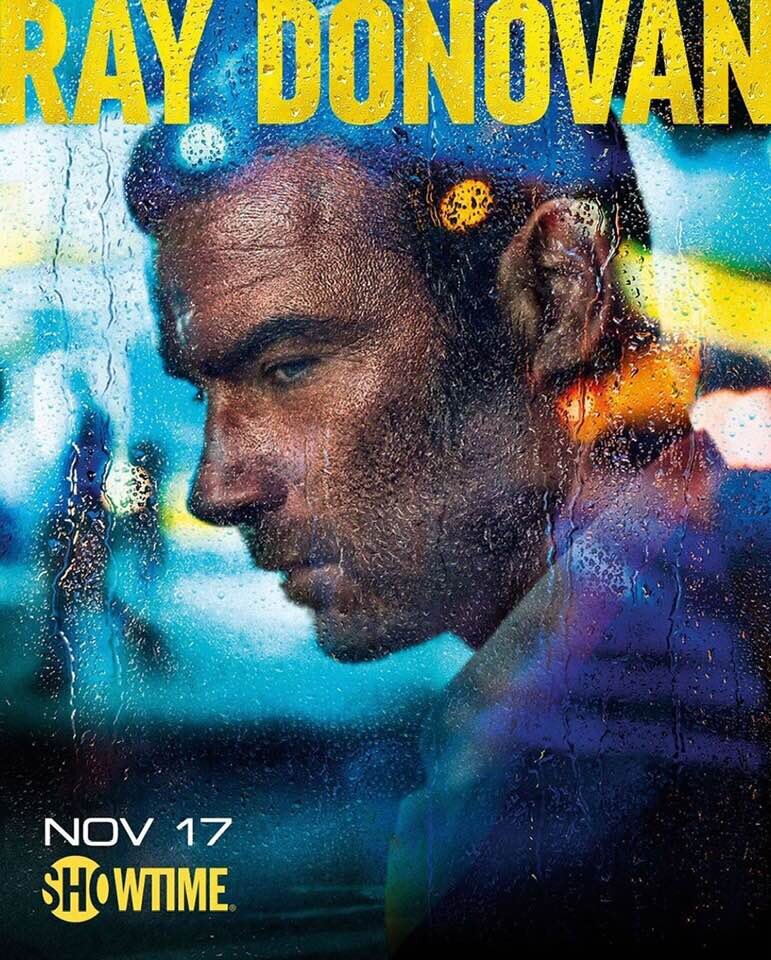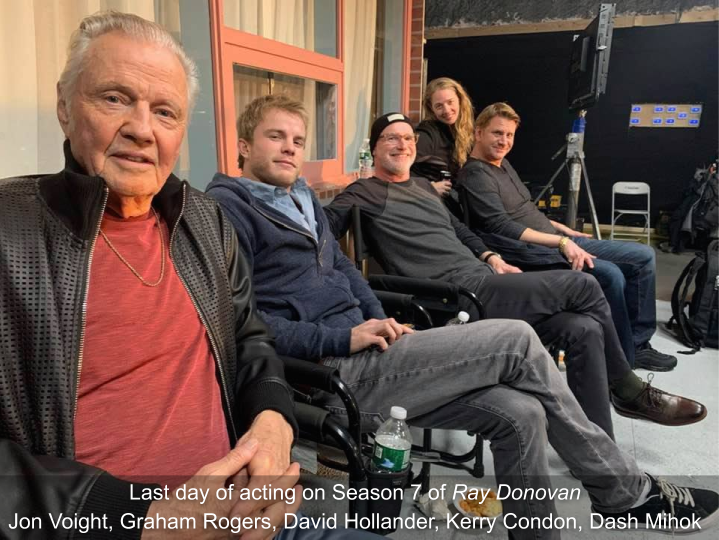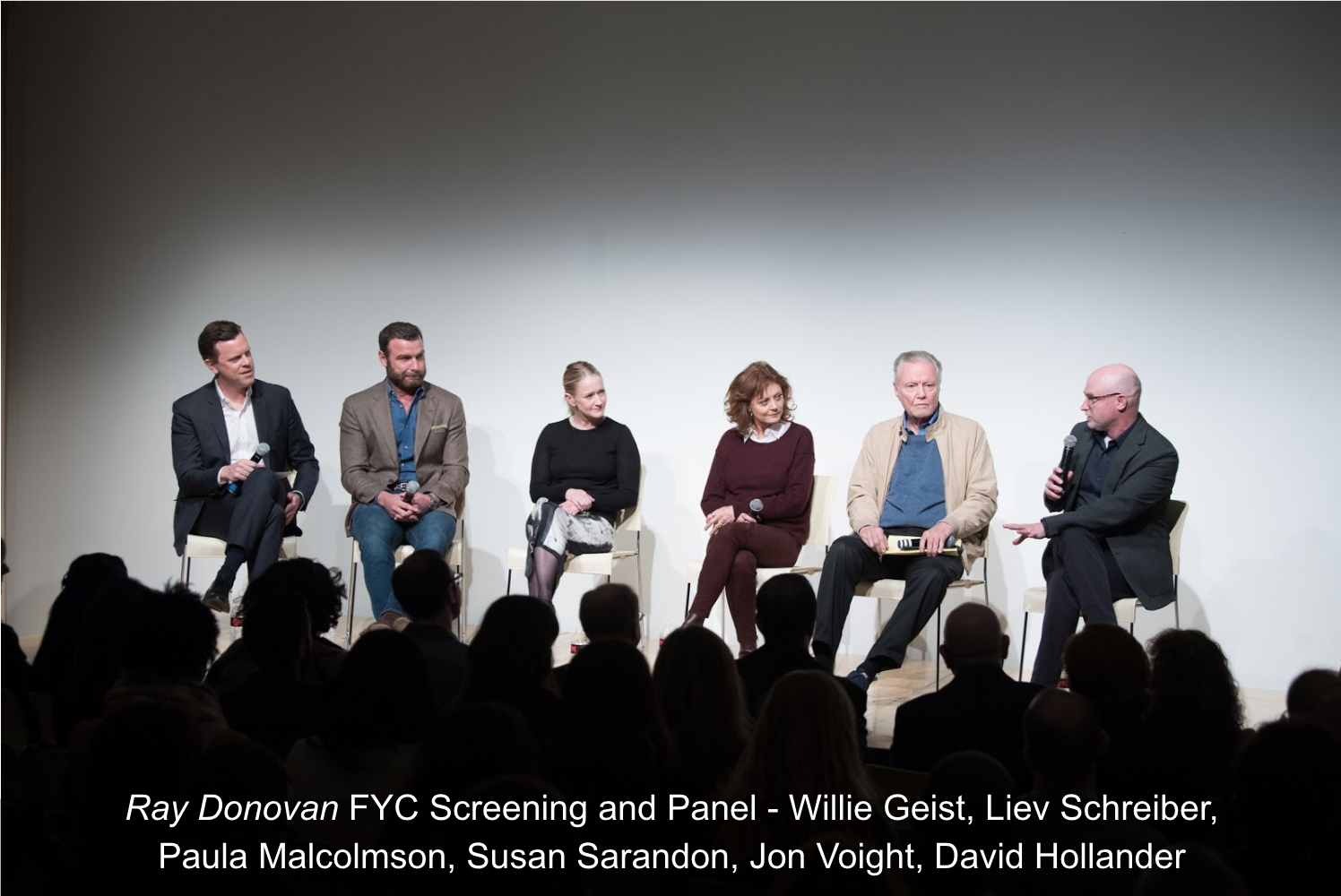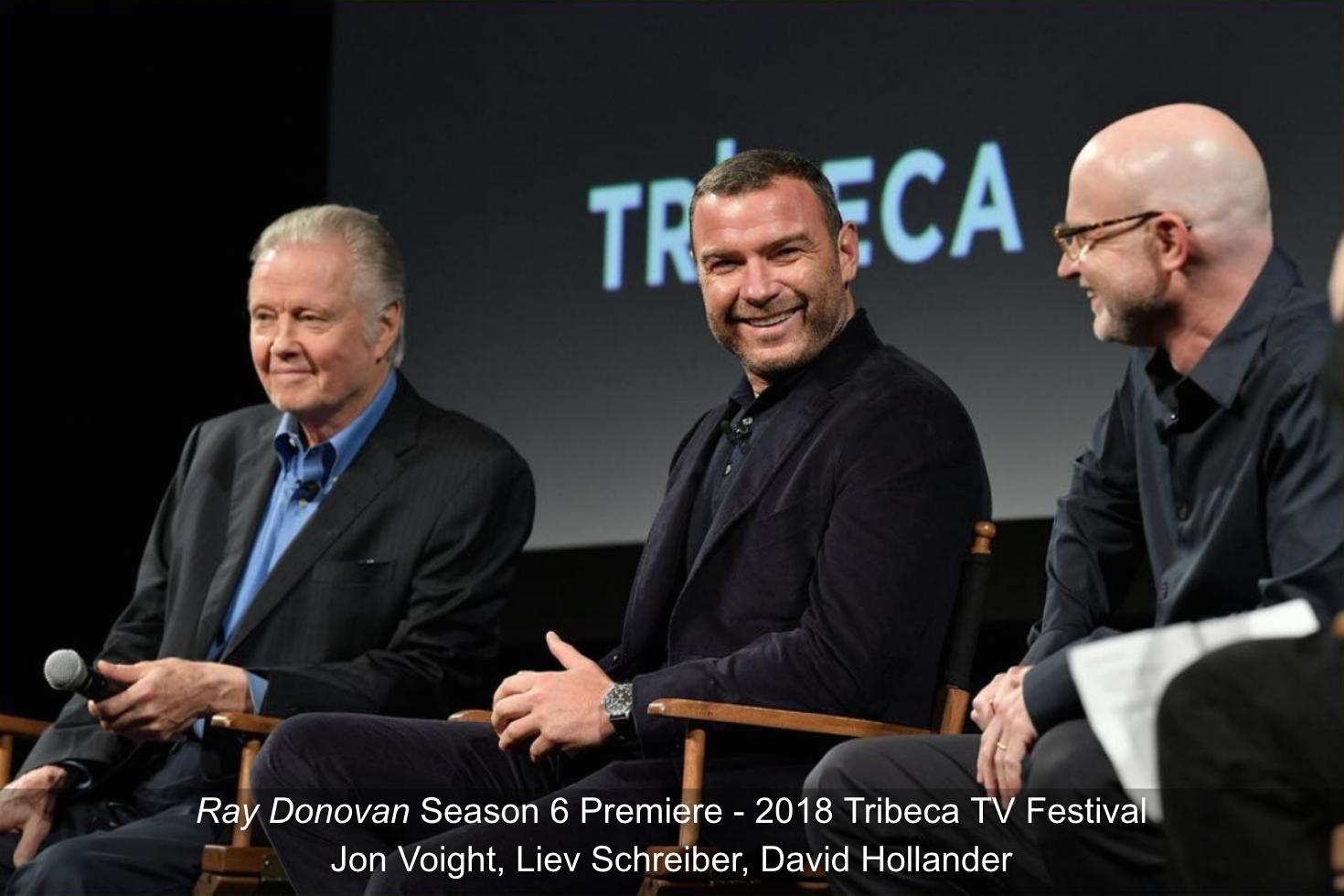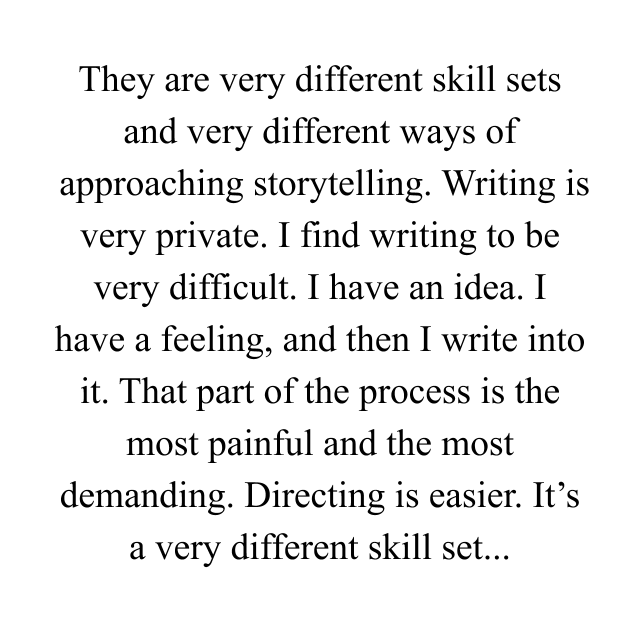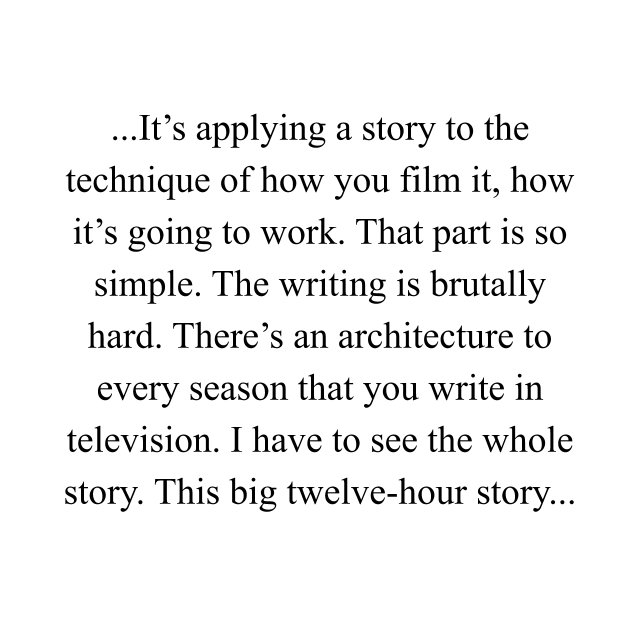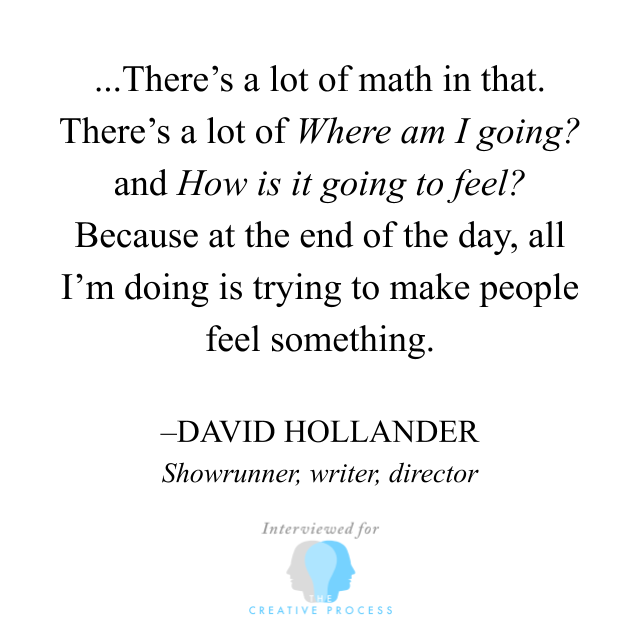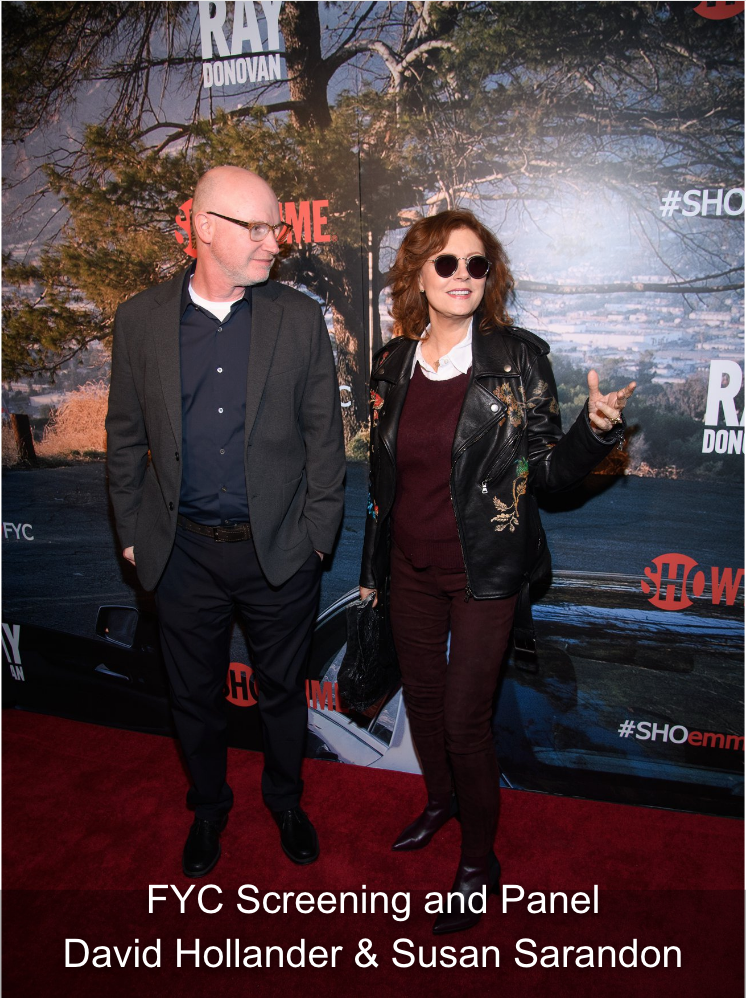David Hollander’s career as a television creator, showrunner, screenwriter, producer and director has included Golden Globe winning drama Ray Donovan, The Guardian, Heartland and The Cleaner. As a writer, he began his career as a playwright in the early 1990’s with productions in New York and Los Angeles. In 1994, Hollander turned to screenwriting, working for Paramount Pictures and other major studios. Working in television since 2000, he has written over 100 credited episodes and directed over a dozen episodes. His film credits include directing the feature film Personal Effects, starring Michelle Pfeiffer, Kathy Bates and Ashton Kutcher. A talented musician, he discussed with Mia the emotional core of his writing and how music informs his stories. He is currently continuing his work on Ray Donovan and adapting American Gigolo into a TV series for Showtime.
THE CREATIVE PROCESS
Last time we spoke, you talked about a television show being an organism or having an architecture.
DAVID HOLLANDER
A television show is a massive undertaking. It has so many components that have to work together and harmonize and be in synergy. And in order to be successful, I believe, in order to yield a story that's both good and successful for the audience, but also makeable, my job and with many others is to create a foundation that everyone can share. That's just not only in the scripts but in the climate of the way we make things and the expectations. The architecture of story, it's everything in television terms because when you break it down, a season of television is really measured in a number of scenes, in a number of locations and the time we have to make it, right? It's very specific. You know, we have one hundred and five days to shoot 10 hours of television this year, right? That's what we got.
So each script has to tell this whole story, but also you have to be able to execute within that frame. It's a massive endeavor of math. And so one element of the architecture of telling stories in television, as a showrunner and as a creator of TV, is you have to build something that is achievable. No different than an architect would lay out the plans for building a skyscraper.
THE CREATIVE PROCESS
I'm currently doing this painting that honors the behind the scenes people. I'm just interested in this whole selection process. How you selected the writers and you create that family, that season. The different visual aspects. How you make sure that all marries together. So, behind the scenes, how do you choose actors to work together?
HOLLANDER
When I was younger, when I first started running shows, now almost 20 years ago, I would answer this question differently, and that I thought then that I had a lot to do with it.
THE CREATIVE PROCESS
Humility, you would say.
HOLLANDER
Well, it's true. And so, here's the thing. The more I do this job, the more I realize that the biggest part of the job is to be vigilant around everything. Be vigilant and be open to collaboration at every level.
And that means being the first in and the last out and the person who is open to listening the most to all things coming in. That is not about people listening to me. I have learned this job over the years. I get it the first word, and I get the last word. The first word is the scripts. The last word is the cut. I write the scripts before we start to film. I do the cut long after we're done shooting. Everything in between, I don't need to control because I've given the first word, and I get the last word. Everything in between then is about asking other people to do their very best work because they're the ones doing the work then, right?
I mean, yes, I'm writing, and yes, I'm making decisions all day. And yes, those things are taxing and tiring and time-consuming. Absolutely. I understand what this job does...any other human being doing this job I have, I could explain better than myself. It's 100 hours a week, minimally, of this job. You live it. It takes over your life. It's what you do.
That said, when you're surrounded by really talented people doing their very best work, all you have to do is give them... The scripts are really hard to write, no doubt. The scripts are fucking brutal to write.
But you have to give them the story and in a way, you have to just listen and get out of their way and let them give you enough material back so that when I'm back in the editing room months from now, I have what I needed. They gave it to me. I didn't do any of that.
They did it. The set designers built sets, and the actors interpreted, the gaffers and the grips and the crew made it so. And it was lit so. And all this. The prop people and all the creation that goes on, and it's an enormous amount of creation that goes on, to take these words that I write down and make them filmable.
And so by architecture, really, what I'm trying to share in a way is here is what we're doing. Here is the shape of it. This is what the building's going to look like. And some people are going to come in and want to put pink shag carpeting down, that I hate, and I'll say no to the pink shag carpeting. And I say, "No, I'd rather it be this–different tones or different colors.”
But no matter what I say, they are still going to do it their way, even within the confines of me saying no to the pink shag. They're going to find something that's theirs.
THE CREATIVE PROCESS
They have to have ownership of something.
HOLLANDER
100 percent ownership. They can only respond to me like I respond to them. So I have more and more come to see that my job is to sweat the scripts enormously and then to fall in love with whatever has come back to me in the dailies.
THE CREATIVE PROCESS
This is what I found so moving because I had the chance to go to your last wrap party, and I saw the amount of respect that you have for people from all parts of the show. And I just thought it was so egalitarian and so I can see how this would really bring the best out in people. And also, you shared your script with me. I think you also share them with other people.
HOLLANDER
Anybody who wants to be involved in the creative process with me is welcome.
THE CREATIVE PROCESS
I think that that's beautiful because I heard other people, they lock it down.
HOLLANDER
I think people lock it down because they're afraid of criticism. Or they're afraid they're going to be told no about something. I know a lot of people who withhold their scripts 'til the very last minute in order to not let other people change anything or interpret it.
Yeah, I mean, some of that work is really wonderful. I don't want to operate out of that kind of fear.
THE CREATIVE PROCESS
Because you said that you like rehearsals. You don't want to surprise them completely with what's happening.
HOLLANDER
I want to get the best from people. I get one crack, like all of us. What I write for film and television is never going to be done again. It's not like when I write a play that I write for perpetuity, and it can be done by dozens of different actors and dozens of different cities all around the world, whatever, and they will honor the text that I wrote because it was built for that. This is built for one actor at a time. It's built for Liev. It's built for Jon. It's built for Eddie. It's built for Dash. It's built for Kerris. It's built for Pooch. It's built for Sandy.
I'm writing directly to them, and they, in turn, have to give me their best, even if I don't agree with what they want to do, and they don't agree with what I'm imposing upon them. Somewhere in the middle, we have to meet.
THE CREATIVE PROCESS
And it's interesting because I am thinking back about your experience moving between different classes, different cultures, and how one becomes aware of tones, different tones, different ways of communicating, so I think this is good for preparing for dealing with different actors. How do you–may I ask–how do you present the stories to these different actors that you mentioned?
HOLLANDER
It's like you rip a Band-Aid. The truth is that every time I put a script out, I'm not expecting it to be met with joy and gratitude. I'm expecting it to be met with challenges. Great actors have to find themselves inside of everything.
Initially, I think most actors don't see themselves inside of what you send them on their first read. They read through, and they go–Fuck that. It's an imposition. My experience. Other writers may have, again, every writer has a different experience. I've rarely worked with actors who have been simply conduits of my words.
THE CREATIVE PROCESS
But you like it, as I understand.
HOLLANDER
I love it.
THE CREATIVE PROCESS
...that they react strongly?
HOLLANDER
I prefer it. It's painful. It's not for the faint of heart because it means that I have to deal with their insecurities and deal with their frustration with me and deal with their desire to recreate and recast what I've written.
And that process is really grueling. However, that process yields something greater than what I wrote because like we talked about last time, when I said put it on the ground, writing literature is not writing actable drama.
And somewhere between the idea that I had and the thing that we can do is a marriage of where an actor needs to pull it into their heart and their being to play the moments that are mysterious to both of us in the script. I'll put a script out, and I will see it's... I have a vision. I see this is how I want it to be, right?
And that's not necessarily the way they want to do it or can do it. And so, thus begins the negotiation, right? It's why I love to direct because I'm right at the heart of the negotiation. I'm right… There's only me, the script that I wrote, the actor, and we're negotiating. We're negotiating their truth and my desire to form a narrative and my expectations versus their realities. My fantasies versus their abilities. And I'm not saying their abilities are not up to the task.
I think a lot of great writers are like–Well, they just couldn't do what I wrote. And they get upset. The truth is one should always root for their actor to be great. One should always root for the performance of the person in front of the camera, not for the words they wrote…
TV writing was never my goal. When I first started, I wanted to write poems, and I wanted to write plays, but I grew up in a small city, and there was not a lot of... no one was a writer. No one was doing that for a living.
My father comes from a poor background. Hungarian immigrants. My mother comes from a family of immigrants as well. And the city I grew up in had that grouping. My sort of working-class Jewish family, and then there was a very upper-class wealthy world. And I ended up going to a high school where a lot of the wealthy people lived. So I was balancing between the two places and it created a reality, an aesthetic in me that I wanted to write about. The distinction between the working class and the upper class. That's where it began for me.
And then characters who were impacted. Sort of male American impacted characters who were put in situations where they were striving or close to wealth or close to sort of things that were the American Dream, but they weren't really wanting it. So characters like Ray or characters like my first show were really about people that were negotiating the distinction between working class living and, frankly, upper-class living.
THE CREATIVE PROCESS
And there's a conflict but also a kind of, in Ray, a kind of admiration. There's this longing to be in that world, as I see it. It's a heroic character. I want to discuss your whole body of work. As long as we're there, I think it seems like a very difficult line to keep his edginess and to keep our compassion for him. I mean he does some terrible things but he does you know very admirable things, in his defense.
HOLLANDER
Yeah, I mean I'm really interested in the old school American male construct, as it meets modernity, if you will. What is this John Wayne or noir character in the 50s, 40s, 30s and the 20s that the American story was sort of built on. These impacted male areas that feel like they have to be ultra-masculine and ultra strong and do these things that are either violent.
That concept has always been fascinating to me. When you add another piece to those characters, whether it's sexual abuse, addiction, confusion about who they are and where they come from. And that's what fascinates me the most, the American male prototype mixed with their complex backgrounds. So what do you if you're supposed to be this super strong heterosexual character, but you've had sexual abuse? What do you do if you're an addict? Or what do you do if you've lost somebody early in life and you've left to change your paradigm? So most of the things I write about are that character.
THE CREATIVE PROCESS
It's interesting because throughout and I find that the tension is compelling. Speaking about Ray, but also of your other work. Personal Effects or other stories. With Ray, I'm often reflecting–his life really could have turned another way. Really, at core, he is this compassionate person. It seems it comes out he's defending people, even people who aren't family, but particularly family. And that you see, Oh if there hadn't been this sexual abuse, if there haven't been this I could envisage... I don't know what he would be, but he's very capable. In some ways, he seems like a kind of stressed out CEO, except handling a different set of problems.
I was wondering how, of course, the characters are inventions, but how certain elements of your personal life or your family appear in your work. I know your brother has this very admirable project Kids Voices. And I was wondering how those things are, if I may say, also some personal grief would overlay the storytelling.
HOLLANDER
I think for me. I think a lot of people in the States where I come from, sort of working class or smaller cities. Loss, confusion. For me, I lost my mother when I was younger, I was never particularly successful in the ways of the culture I was in. Whether it was athletics, or whether it was a sense of hyper-masculinity that I didn't really feel so I started to write stories about hyper-masculine people who had tremendous chinks in their armor. Part of it was about grief and dealing with grief so almost every character I ever write has a loss of a mother, a loss of a sister, a loss of somebody feminine in their life and a desire to be this kind of hyper-male and in doing, in wanting to be a sort of savior or wanting to be someone very powerful. Running it into themselves.
Who do you want to be? And who are you? I think most of the characters that I write about have a deep conflict about their sexuality and a deep conflict about their relationship to family.
They want to be the most powerful person who provides or creates safety, but they're also very dangerous because of that desire. And this idea that control creates in a way violence and a threat to their own outcomes. So Ray is very much like that. He is so much about controlling his family, but actually, he's doing harm to them because of that control. His fear of the things that happened to him happening to them, his desire to put a bubble around everything usually ends up creating huge problems for him.
THE CREATIVE PROCESS
Just thinking about the notion of control. There are just two questions. Is that something, is that why you're drawn to it, is that something you see a lot in American society in particular? An inability to face the vulnerabilities or to lose control? And then, speaking of control, it seems to me–I can't imagine how you do it as a writer and a showrunner and then you direct episodes. This very private process, a vulnerable process. I know you also work with other writers, but it's private. And then you transition to this, I don't mean very controlling but you're managing all of this.
So what is your directing style? What is the process and how do you transition from all those different roles?
HOLLANDER
They are very different skill sets and very different ways of approaching storytelling. Writing is very private. I find writing to be very difficult. I have an idea. I have a feeling, and then I write into it. That part of the process is the most painful and the most demanding. Directing is easier. It’s a very different skill set. It’s applying a story to the technique of how you film it, how it’s going to work. That part is so simple. The writing is brutally hard... There’s an architecture to every season that you write in television. I have to see the whole story. This big twelve-hour story. There’s a lot of math in that. There’s a lot of Where am I going? and How is it going to feel? Because at the end of the day, all I’m doing is trying to make people feel something that I feel.
THE CREATIVE PROCESS
And do you find sometimes even if it looks good on paper, it doesn't translate very well?
HOLLANDER
In fact the better it looks on paper, often the worse that it is. It's a strange thing. Ugly scripts make great films. Great scripts sometimes don't. It's hard to explain. Like I can write something so beautiful and so poetic and it's not filmable. But I can write something that's just guttural and a mess and it works and it's very hard to explain why that is.
THE CREATIVE PROCESS
I like reading scripts and I like seeing the final product. It's fascinating to read scripts. I think they're so interesting and it's true some are beautifully written. If you read a Tennessee Williams, all the descriptions and all that, but it's really changed the way we view things. You can see it going back like a decade or two, there's a difference to our attention spans and the way we receive stories. So it's a leap because you have to hear and see those characters. And is it the minimalism that's difficult?
HOLLANDER
If by minimalism you mean the specificity and the smallness. I like to call it putting it on the ground. If you write dramatically from 30,000 feet and you're above it and you're trying to say something–you're fucked. It only works when you put it on the ground and you make it playable. And it's very hard the older I get, the more that I do it to explain it. To make it work is be alive to it right up to the moment that you film it.
When people want to talk to me about writing. Yeah, I'm a writer. Not really in that form [prose...] I'm actually something that people don't quite understand a lot. Cinematic writing, which is, for those of us that are filmmakers and writers–we're not writing literature. We're doing something different.
THE CREATIVE PROCESS
You're motivating you. You're bringing their energies.
HOLLANDER
I'm giving my actors an intention and an obstacle, but I'm also giving myself. I know where the camera is going to be. I'm giving my crew a challenge. How do we shoot it? And all of that has to cohese into something that the viewer feels. So I'm not really a writer, that way, I'm actually... It's very hard to explain.
It's not writing–it's math plus emotion plus technical plus time plus visual plus something that's ineffable, which is just... I so badly want to communicate with my audience.
THE CREATIVE PROCESS
It’s interesting how you write about the fathers and father figures in your stories. I mean even Mickey, who we were not predisposed to feel affection for, we see that he's really just trying to say he loves his sons. They're not listening.
You have children?
HOLLANDER
I have three.
THE CREATIVE PROCESS
What do you tell them? Are they pursuing artistic paths as well? What do you make sure that they know?
HOLLANDER
My children are... What I know to not tell them is probably more than what I tell them. I tell them that I love them. I tell them that they're free to pursue what they want to pursue. I try to be an example to them of someone is in the process more than a product. And they'll land where they'll learn. I don't think I can give them a guidebook.
It's going to be a world of rejection and a world of confusion and a world of hotel rooms. If they are successful at it. But I don't have advice for anybody. That's why I stopped teaching. My students would say, "Am I good?"
THE CREATIVE PROCESS
Sometimes you have to tell them what they've written is not good.
HOLLANDER
It doesn't matter what I think. Because it only matters if they keep doing what you're doing. Your vision will either resonate or it won't. But it's not up to me to tell you whether it's good or not. I can only tell you to practice your technique. And do the shit that's boring, which is to write every day. Don't be afraid of rewriting. Learning rejection is actually your best friend. People fighting against your idea are your best friend. That's the only thing I can teach you. The more people say no to you, the more you listen to why they're saying no. Now that you accept it, that you listen to what they're saying and maybe you find ways to take that tension, that opposition and infuse it into the next pass. Your anxiety, your fear, those are your friends. It sucks, but it's true.
PORTRAIT OF DAVID HOLLANDER
Hollander says, “All I’m doing is trying to make people feel something.” How do you communicate an emotion, an idea that begins with a writer sitting in silence, widens out to conversations with directors, writers, actors, camera operators, editors, and other members of the crew?
And with all these voices coming from different directions, how do you make them go in the same direction? How do you work through the obstacles of budgets and locations and creative differences to finally put a scene “on the ground” so that it still retains the intimacy of the original, dreamt up in a room as quiet as the one we are sitting in? And then surpasses it.
How do you translate a feeling from one mind to another? Not just a feeling experienced by the cast and crew, but one that now reaches 20 million international viewers.
Before our conversation, I was at the wrap party for Season 6 of Ray. I saw how much it really is a show about a family and how Hollander has nurtured a familial spirit in the cast and crew. I see the way he is with actors. They tell me notes he gives them to get stronger, more emotional performances. He is kind and considerate to everyone–the stand-ins, the scenics, camera operators. I don’t get to see him work with the writers, but they are a small group, and I imagine that it’s a collaboration like the others, founded on respect and listening. I was told that on some television shows there’s a lot of secrecy with scripts being closely guarded, but that at Ray Donovan scripts are shared beyond those directly involved in the scenes. I imagine that that level of trust inspires crew to be more emotionally and creatively involved in the stories they help tell. The difference between actors saying lines that have been fed to them and believing the words are theirs. The difference between the crew knowing and taking ownership of the architecture of the 12-hour story so that the opening long tracking shot moves beyond the technical aspects of hitting marks to a scene and season finale that vibrates with feeling and meaning.
Special thanks to our collaborating universities and students. Associate Interviews Producer on this podcast was Allison Thevney. “Winter Time” was composed by Nikolas Anadolis and performed by the Athenian Trio.
Find us on Apple Podcasts, Spotify, Google Podcasts, Podcast Addict, Pocket Casts, Breaker, Castbox, TuneIn, Overcast, RadioPublic, Podtail, and Listen Notes, among others.
Mia Funk is an artist, interviewer and founder of The Creative Process.




